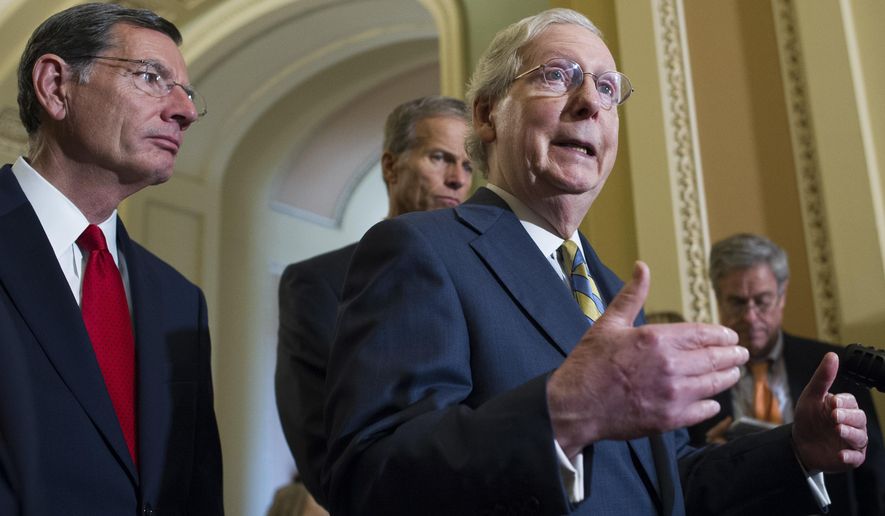Senators passed legislation Tuesday to fund the Pentagon and key domestic departments for all of 2019, along with stopgap money to keep many other agencies running into December, giving Congress a chance to finish its work without facing a government shutdown.
The Senate voted 93-7 to approve about $850 billion for the Defense, Labor, Health and Education departments for the upcoming fiscal year. Those departments combine for the lion’s share of annual federal discretionary spending.
If the bill clears the House and earns President Trump’s signature, it would defuse the bulk of the shutdown threat the president had threatened to pursue after the election.
“This is the most significant step we have taken yet,” said Sen. Richard Shelby, Alabama Republican and Appropriations Committee chairman.
Speaker Paul D. Ryan said the House will take up the defense-domestic package and that “we are ready to get this bill into law soon.”
Should it pass, it will mark the first time in at least a decade that Congress has cleared the two largest annual appropriations bills before the Oct. 1 start of the fiscal years.
Lawmakers also included language that would extend current-year funding through early December for any of the outstanding annual bills they don’t pass by the end of the month. They have already sent three to Mr. Trump’s desk, and hope to get as many as nine though the House and Senate by the end of the month.
The White House has not committed to Mr. Trump signing all the bills, but lawmakers said they are hopeful.
“If he signs this bill, the shutdown discussion should be over for this year,” said Sen. Roy Blunt, the Missouri Republican who chairs the spending subcommittee that handles labor, education and health spending. “And maybe we developed a pattern here of grouping these bills in a way that allows members to see them on the floor and debate them on the floor and get them to the president’s desk a few at a time.”
Mr. Blunt said the president deserves credit for insisting in March that lawmakers not send him another massive “omnibus” bill, where all 12 individual spending bills were grouped into a $1.3 trillion package. Instead, they’re likely to send him at least two “minibus” bills that still combine multiple departments and agencies.
Both Democratic and Republican leaders came into this year’s spending process embarrassed by two brief shutdowns in the fiscal year 2018 debate, and after years of gridlock.
GOP leaders agreed to forgo controversial policy-related fights over abortion or immigration, and Democrats said they wouldn’t use the filibuster as leverage to force a deadline shutdown fight.
Mr. Trump, however, has repeatedly cheered for a shutdown, saying a showdown could help him win funding for his proposal to build a wall on the Mexican border.
The Homeland Security spending bill, which covers the border, is one of three that are unlikely to get done in time for the fiscal year’s start. The others cover money for the State, Commerce and Justice departments. Those are all likely to need the stopgap funding.
Mr. Trump could preserve at least a partial shutdown threat by vetoing some of the bills Congress is sending him, but lawmakers said they haven’t seen any indication that’s in the cards.
“I think he wants to try to get them resolved and he’s been pretty clear he wants to get wall funding, and [there’s] nothing wrong with that — trying to deal with national security,” said Sen. James Lankford, Oklahoma Republican. “But I’ve not seen a veto threat.”
The House and Senate have already sent a three-bill, $147 billion package that funds energy, water development, veterans affairs, military construction, and legislative branch programs through Sept. 30, 2019 to Mr. Trump’s desk. That bill sailed through the House 377-20 and passed 92-5 in the Senate.
Sen. Ben Cardin, Maryland Democrat, said such overwhelming margins neutralize any would-be veto threat from the White House anyway. as just a two-thirds majority in both the House and Senate would override a presidential veto.
“I think 93-7’s probably the most effective message to the president. He’s going to sign it,” Mr. Cardin said, referring to the bill passed Tuesday.
The $674 billion in funding for the Pentagon in the Senate-passed bill includes about $143 billion for military personnel, $24 billion for Navy shipbuilding, and money for a 2.6 percent pay raise for U.S. troops — the biggest increase in nine years.
The package that passed Tuesday also includes about $90 billion for the Heath and Human Services Department, including a $2 billion boost for the National Institutes of Health. It also provides about $71 billion for the Education Department and about $12 billion for the Labor Department.
• David Sherfinski can be reached at dsherfinski@washingtontimes.com.




Please read our comment policy before commenting.